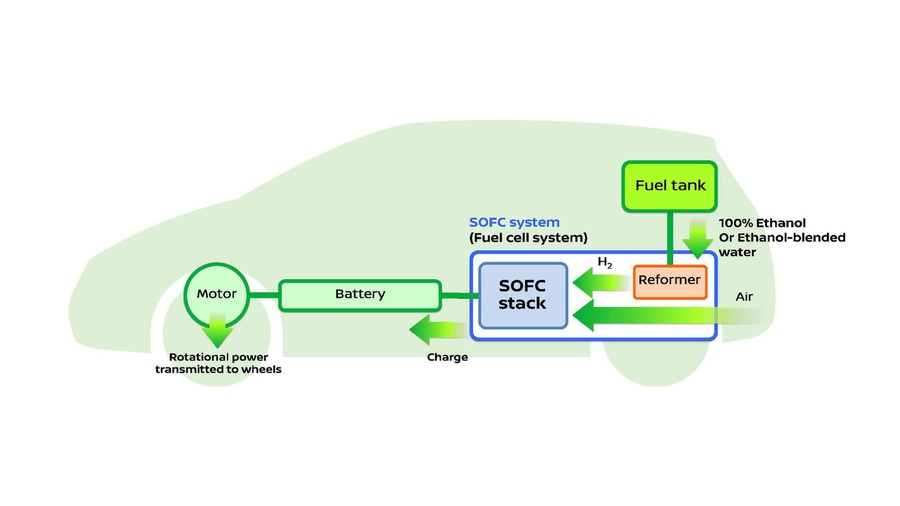Сами по себе SOFC-системы не новы, однако из-за конструктивных особенностей исследования в этом направлении ведутся преимущественно в отношении крупных промышленных установок. Твёрдооксидные электролиты в подобных устройствах работают при высоких температурах (от 700 °C), но при этом не нуждаются в дорогой платине. Nissan намерен использовать в силовой установке отдельный риформер, который будет производить водород прямо в машине из этанола.
Далее в блоке SOFC происходит химическая реакция между полученным водородом и кислородом из воздуха, благодаря чему вырабатывается необходимое для мотора электричество. Единственным «побочным» эффектом остаётся вода. В результате Nissan надеется создать экологически чистый, динамичный и почти бесшумный электромобиль, который не нужно будет долго заряжать. К тому же производство биоэтанола уже распространено в странах Южной Америки и Азии, где сырьём является сахарный тростник или кукуруза. Заправка относительно недорогим топливом займёт всего пару минут, а запас хода составит порядка 600 километров.
«При выработке электроэнергии в системе на основе топливных элементов обычно выделяется углекислый газ. Но в системах, работающих на биоэтаноле, выбросы СО2 нейтрализуются, начиная с процесса выращивания сахарного тростника, из которого затем получают биотопливо. Таким образом, общее количество углекислого газа практически не увеличивается», - отметили в Nissan.
На данном этапе у Nissan ещё даже нет прототипа автомобиля с такой силовой установкой, а испытания проводятся на отдельном стенде (фото под заголовком). Соответственно ни о каких сроках создания подобных легковушек исследователи говорить не готовы. Впрочем, отмечают они, такая технология является более перспективной и безопасной, чем машины с топливными ячейками, которые необходимо изначально заправлять водородом. Таких как, например, Toyota Mirai иди Hyundai ix35 Fuel Cell.
Nissan announces development of the world’s first SOFC-powered vehicle system that runs on bio-ethanol electric power
YOKOHAMA, Japan (June 14, 2016) – Nissan Motor Co., Ltd. announced today that it is currently researching and developing a Solid Oxide Fuel-Cell (SOFC)-powered system that runs on bio-ethanol electric power. The new system— a world first?for automotive use—features an e-Bio Fuel-Cell with an SOFC power generator. SOFC is a fuel cell utilizing the reaction of multiple fuels, including ethanol and natural gas, with oxygen to produce electricity with high efficiency.
About e-Bio Fuel-Cell
The e-Bio Fuel Cell generates electricity through the SOFC (power generator) using bio-ethanol stored in the vehicle. The e-Bio Fuel-Cell utilizes hydrogen transformed from fuel via a reformer and atmospheric oxygen, with the subsequent electrochemical reaction producing electricity to power the vehicle.
Unlike conventional systems, e-Bio Fuel-Cell features SOFC as its?power source, affording greater power efficiency to give the vehicle cruising ranges similar to gasoline-powered cars (more than 600km). In addition, the e-Bio Fuel-Cell car’s distinct electric-drive features—including silent drive, linear start-up and brisk acceleration—allow users to enjoy the joys and comfort of a pure electric vehicle (EV).
Fuel-cell systems use chemicals that react with oxygen, generating power without release of harmful byproducts. Bio-ethanol fuels, including those sourced from sugarcane and corn, are widely available in countries in North and South America, and Asia. The e-Bio Fuel-Cell, using bio-ethanol, can offer eco-friendly transportation and create opportunities in regional energy production, while supporting existing infrastructure.
When power is generated in a fuel-cell system, CO2 is usually emitted. With the bio-ethanol system, CO2 emissions are neutralized from the growing process of sugarcane making up the bio-fuel, allowing it to have a “Carbon-Neutral Cycle,” with nearly no CO2 increase whatsoever.
The Future of e-Bio Fuel-Cell
In the future, the e-Bio Fuel-Cell will become even more user-friendly. Ethanol-blended water is easier and safer to handle than most other fuels. As this will remove limits on creating a totally new infrastructure, it has great potential for market growth.
Running costs will be remarkably low—on par with today’s EVs, ultimately benefitting the public as well as businesses, because the e-Bio Fuel-Cell is an ideal fit for wider customer needs because of the short refueling time and ample power supply that can support a range of services such as refrigerated delivery.
The Quest for a Zero-Emission Society
In pursuit of realizing a zero-emission and zero-fatality society for cars, Nissan continues to promote vehicle intelligence and electrification. Nissan’s brand promise of “Innovation That Excites” is delivered with “Nissan Intelligent Mobility”, which focuses on how cars are powered, driven and integrated into society through a more enjoyable driving experience.
The e-Bio Fuel-Cell will realize the concept of “Nissan Intelligent Power,” promoting greater efficiency and electrification of cars and the joys of driving, alongside battery EVs, such as the “Nissan Leaf”, “Nissan e-NV200,” and “e-Power,” which is equipped with an engine housing an exclusive large-capacity motor and power generator.
Nissan will continue to provide value to its customers by incorporating systems that enable the extraction of electric power from various fuels, while addressing the infrastructure issues tied to energy supply in every region of the world.


.jpg)



